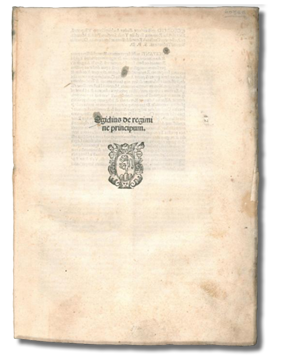Although a younger Richard may have desired to aspire to certain heroic figures of chivalry, as a son of a man believed to have been the rightful king, and as a brother to Edward IV, he would have been expected to learn what this meant and what responsibilities would be required of him. For centuries, those of noble blood were given guidance through books known as Mirrors for Princes.
The Catholic Encyclopedia's entry1 describes them as:
Literary genre offering a model for the ideal prince to follow; especially popular in the late Medieval and Renaissance periods, called also Speculum principum. Treatises of this kind were of three related types; some depicted famous princes biographically with an emphasis on the high quality of their persons and the skill of their statecraft; some described historical personalities in a highly idealized and poetic way in order to produce a maximum idealistic impact upon the noble reader; and others presented practical rules, principles, and norms for the conduct of a prince. In some of the literature there was a shading from a practical discussion of the management of political affairs to a treatment of the theoretical foundation of the office of the ruler.
The roots of the mirror of princes literature reached back into classical antiquity, where Plato's description of the philosopher-kings in the Republic and Aristotle's Politics and Nichomachean Ethics were the most influential sources. Xenophon and Isocrates contributed to the tradition. A compilation of moralisms from Plutarch titled Institutio Traiani was to be much imitated during the medieval period. Roman antiquity in turn contributed substantially to the development of this genre of writing. Seneca's Moral Essays and Marcus Aurelius's Autobiography, stressing the importance of the ruler's interior qualities, reinforced Cicero's earlier work. Three other influential writings were Pliny the Younger's Panegyricus, Claudian's Panegyricus de quarto consulatu honorii, and Vegetius's Epitome rei militaris. These classical sources were cited in the fully developed mirror of princes literature of the 12th to the 18th centuries.
The early Middle Ages was influenced by Augustine's description of the good emperor in his City of God. The pseudo-Cyprian, composed in Ireland during the 7th century, was important during the Carolingian period. By this time the ideal prince was depicted as one who was loyal to the Christian faith and was of service to the Church and to the monastic way of life. The earliest elaborate medieval treatise on politics was John of Salisbury's Policraticus (1159), which included, with its organic theory of the state, a discussion of the duties and rights of governors as well as of the true king as God's vicar. A contemporary of John of Salisbury, Giraldus Cambrensis, composed De instructione principum, which he loaded with moral preachments but with little practical advice. Similarly, Vincent of Beauvais's De morali principis institutione (1260–63) had a pious flavor and bristled with references to Scripture and the Fathers. In the 13th century, however, Arabic-Aristotelian ideas that contributed a new element of secular realism were added to the revived classical ideas of the 12th century. The pseudo-Aristotelian Secretum secretorum, purporting to represent the correspondence of Alexander and Aristotle, had considerable influence through its Latin translation by Philippus (prior to 1243). Aristotle's ideas were evident in St. Thomas Aquinas's De regimine principum as well as in the work by the same name of Giles of Rome, the latter being indisputably the most important work of this type. Giles's treatise was less a discussion of the nature of the state than a true mirror for a prince, written to instruct the heir to the French crown before the death of King Philip III in 1285.
Renaissance humanists, imbued with classical ideals and often personally in the service of princes, developed this type of writing into a fine art. Petrarch himself set the precedent with his De republica optime administranda. The poet Pontanus wrote on the subject and Savonarola touched upon some of the same familiar themes in his Tractate on the Organization and Government of the City of Florence. Certainly the most renowned treatise in the mirror of princes category was N. Machiavelli's The Prince. Although many of the themes in The Prince were of a familiar sort - e.g. liberality, keeping faith, love and fear, flattery, friendships, and the king's ministers — Machiavelli disagreed with the earlier treatises, which had demanded that the good ruler must himself be a good man and the best moral example for his subjects. Instead, Machiavelli urged that the standard of the good ruler be whether he succeeds (one way or another) in securing the well-being of the citizens of his state. In contrast to Machiavelli's work, both the treatise of Budé and Erasmus's Instruction of a Christian Prince seem traditional in cast. Later works of the mirror of princes type include Bossuet's Politique tirée de l'Écriture Sainte, Campanella's Monarchia Hispanica, the Jesuit Mari Ana's De rege et regis institutio, Fénelon's Télémaque, and Wieland's Goldener Spiegel, most of them tiresome and banal.
Bibliography:
D. Erasmus, The Education of a Christian Prince (1516), ed. Translated by Lester, K. Born [c.1936], Columbia University Records of Civilization. New York: Octagon Books, 1963
A.H. Gilbert, Machiavelli's Prince and Its Forerunners (Durham, N.C.1938)
F. Gilbert, The Humanist Concept of the Prince and The Prince of Machiavelli, Journal of Modern History 11 (1939) pp 449–483
W. Berges, Die Fürstenspiegel des hohen und späten Mittelalters (Leipzig 1938; repr. 1952)
C. McIlwain, The Growth of Political Thought in the West (New York 1932; repr. 1955)
[L.W. Spitz]
Giles of Rome's version of De Regimine Principum, as mentioned above, was one such book owned by Richard as Duke of Gloucester, in which he had written: Liber illustrissimus Principis Ducis Gloucestr. Although there does not seem to be any online version of this particular manuscript, which is held at Lambeth Palace Library, a description of it may be accessed here:

However, as it was a relatively common book, there are quite a few other versions available online, such as this printed version from 1501:

Unfortunately even this version is in Latin, and no free English translations could be found, although they are available in the form of printed books and their ebook counterparts.
Saying that, Giles of Rome is thought to have been a student of St Thomas Aquinas, who had also written a book with the same title prior to Giles' work and, although there are differences on the emphases given in respect to what was expected of someone in a position of such importance, it may still be of interest to look at the political writings of Aquinas for insight. The following is an interesting piece written by a scholar from Cambridge University:

One particular quote from Aquinas' De Regimine Principum seems particularly apt for Richard and what we know of him:
[W]e do not call Christian princes happy because they ruled for a
longer time, or because they died in peace and left behind sons to
rule as emperors, or because they subdued the enemies of the commonwealth,
or because they were able to avoid and suppress uprisings
against them by the citizens. Rather, we say that they are happy if
they rule justly; if they prefer to govern wicked desires more than
any people whatsoever; if they do these things not out of craving for
empty glory, but from love of eternal felicity. We say that, for the time
being, such Christian emperors are happy in hope and that, in time to come, when that to which we now look forward has arrived, they
will be so in possession.

© Richard III's Loyal Supporters Society




